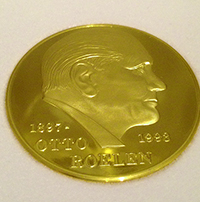Call for nominations of outstanding catalysis researchers for the Otto Roelen Medal 2018

The Otto Roelen Medal is awarded for an outstanding achievement in catalysis research
The Otto Roelen Medal is endowed with 5,000 Euro and sponsored by the Oxea Group. Nominations will be evaluated by the Expert Committee of the Otto Roelen Medal.
The prize will be awarded in a public ceremony at the Annual Meeting of German Catalysis Researchers in March 2018 in Weimar/Germany.
Proposals for nominations should be submitted before 15th September 2017.
Proposals should be accompanied by a detailed justification, the candidate’s CV and a list of publications and patents. Submission of exemplary publications in internationally renowned scientific journals as well as reference letters from industry is also appreciated. Self-nominations are not accepted.
The Otto Roelen Medal was initiated in 1997 by Hoechst AG and is named after the discoverer of hydroformulation.
Originally limited to the field of homogeneous catalysis, the prize is now open to international researchers in the whole field of catalysis.
Former award-winners include Prof. Dr. Matthias Beller, Institut für Organische Katalyseforschung (1997), Prof. Dr. Kay Severin, ETH Lausanne/CH (2005), Prof. Dr. Michael Buchmeiser, Universität Stuttgart (2010), Prof. Dr. Javier Pérez-Ramírez, ETH Zürich/CH (2012), Prof. Dr. Harald Gröger, University of Bielefeld (2014) and Prof. Dr. Peter Strasser, TU Berlin (2016).
http://www.dechema.de/en/ottoroelenmedal2018 – nomination of candidates
http://www.dechema.de/Roelen_Preistraeger – list of former award-winners
Media Contact
All latest news from the category: Awards Funding
Newest articles

Sea slugs inspire highly stretchable biomedical sensor
USC Viterbi School of Engineering researcher Hangbo Zhao presents findings on highly stretchable and customizable microneedles for application in fields including neuroscience, tissue engineering, and wearable bioelectronics. The revolution in…

Twisting and binding matter waves with photons in a cavity
Precisely measuring the energy states of individual atoms has been a historical challenge for physicists due to atomic recoil. When an atom interacts with a photon, the atom “recoils” in…

Nanotubes, nanoparticles, and antibodies detect tiny amounts of fentanyl
New sensor is six orders of magnitude more sensitive than the next best thing. A research team at Pitt led by Alexander Star, a chemistry professor in the Kenneth P. Dietrich…





















